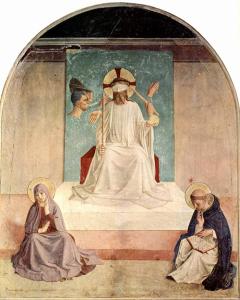Happy Friday, friends! As the week winds down, I wanted to share a few highlights, insights, and sparks of grace that lit up my journey these past few days.
We marked the feast of Saint Ignatius of Loyola with a powerful conversation on Ave Maria in the Afternoon, where Marcus Peter and I explored how Ignatian spirituality invites us to move toward what is broken—both in the world around us and within the hidden contours of our hearts. Whether it’s the daily examen or a deepening desire to serve the poor, these practices aren’t just acts of reflection or service; they are invitations to transformation.
Also in this roundup: I’ve been pondering Church governance thanks to some excellent pieces in Church Life Journal, especially reflections from Bishop Boyea. There’s something invigorating about seeing ecclesial structures in light of spiritual renewal.
For those hungry for spiritual depth, I recommend Sr. Dominic Mary Heath’s reflection on the virtue of studiousness—it’s not just about scholarship, but attentiveness to God.
A bit on the upcoming film Broken Mary about Kevin Matthews. And some thoughts on my most recent time through the Space Trilogy by C.S. Lewis.
As always, thanks for walking alongside me in this incredible journey of life.
I was struck this week by the article “Giving God Our Attention: Learning the Virtue of Studiousness by Sr. Dominic Mary Heath”.

The article begins by examining Fra Angelico’s tremendous fresco, The Mocking of Christ, which offers a profound visual metaphor for the experience of studiously meditating on the mysteries of Christ’s Passion. Author Sister Dominic Mary Heath poses a striking question: how is the suffering of Mary in the foreground connected to the practice of study, as embodied in the figure of St. Dominic?
I found the article immensely helpful in illuminating one of the key pitfalls that has misled much of the intellectual pursuit in modern society—particularly within the contemporary university system. Sister Dominic Mary identifies two prevailing motivations in today’s student:
- The expression of one’s distinctive personality
- The production of some end that is utilitarian
By contrast, the Christian mind does not study for those ends as its primary good. Instead, it seeks the virtue of directing the mind toward God, and through that orientation, to align ourselves morally with the good. This is why true studiousness is intimately connected to a kind of sorrow. It unveils vistas of wonder and contemplation, but in doing so, it subverts our broken wills and desires to the cross.
I believe this reflection is a tremendous balm to the scourge of dopamine addiction that has led many to amuse themselves to death in today’s culture. The article has offered me ample fodder for further contemplation—particularly convicting me of the ways in which my own study has not always been driven by a desire to contemplate God’s goodness.
Far too often, my study has been motivated not by wonder at divine truth, but by a desire to fulfill my own appetite for worldly goods and recognition.
I was encouraged by the series on Church Governance in Church Life Journal. This week. With Contributions from Bishop Earl Boyea and and John C. Cavadini
I was recently able to screen a copy of the upcoming film Broken Mary, which tells the story of Kevin Matthews and his transformation from a legendary morning radio host in Chicago to a traveling Catholic speaker. I would encourage everyone to watch the film when it’s released—I found it to be an inspiring story that many will find relatable.
Matthews’ encounter with Christ arises from a place of brokenness, of need, and of hope. He embodies a kind of gritty masculinity that often emerges in those who, having been wounded, sought protection in a raw—and at times juvenile or hedonistic—lifestyle in their youth, only to confront the emptiness of such facades. The grace within this struggle is an authenticity they carry into their testimony: one that does not seek self-elevation but rather exposes the cracks in their life where mercy floods in—where God generously meets us.
I’ve known many people like Kevin. And I must confess, his story stirred something deep within me. It inspired a desire to be more honestly broken and tangibly in need of God’s mercy. Since viewing it, I’ve found myself praying more fervently—from a posture of need and a longing to run to my mother. Mary offers protection. She guides.
This week I reread C.S. Lewis’s Space Trilogy—a cycle I’ve returned to every few years over the course of my Christian life. There’s something remarkably fun and endlessly intriguing about the trilogy. It’s Lewis at his most unrefined, and that, to me, carries an undeniable charm.
He pours so much of his own intellectual DNA into the books:
- In Out of the Silent Planet, we catch the shadow of H.G. Wells, refracted through Lewis’s mythopoeic lens.
- In Perelandra, there’s a freewheeling theological wrestling with primordial temptation and the origins of evil.
- And in That Hideous Strength, we encounter a mosaic of Lewis’s concerns—chief among them the dismantling of human dignity as laid out in The Abolition of Man.
Each volume stands on its own with such distinct character that evaluating them together feels nearly impossible. Yet taken as a whole (even with the eccentric and unfinished The Dark Tower hovering at the margins), the trilogy remains a treasured oddity in my library. Eclectic and at times structurally disjointed, yes—but profoundly nourishing in spite of, and maybe because of, those very qualities.
I’m rereading the trilogy now with a Catholic men’s book club I’ve been part of for about a year. And with that comes the daunting task: assigning each book a rating on a scale from one to ten. I honestly don’t know how to do it. Each deserves its own rubric. Together, they defy tidy judgment—but they remain beloved.
So this reflection is simply a gesture toward my journey with the books—over the years and again recently, as I’ve retraced the path of Ransom and reacquainted myself with Lewis’s vision of cosmos, evil, and grace.
If you haven’t read them, I’d wholeheartedly recommend the trilogy. And if you have, I’d love to hear your own thoughts: their merits, their failings, their oddities—and what they’ve stirred in you.
Finally, I wanted to draw your attention to a lovely conversation I had with Marcus Peter on Ave Maria in the Afternoon this week, in celebration of the feast of Saint Ignatius of Loyola.
One of the insights that emerged—one I’ve been pondering throughout the day—is the connection between the daily examen and the call to serve the poor and vulnerable. Both practices stand as cornerstones of Jesuit spirituality. And both, in their own way, guide us toward what is broken in our world.
On one hand, service to the poor addresses the visible fractures of society—poverty, hunger, and marginalization. On the other, the examen invites us into an interior confrontation: an honest look at the brokenness within our souls. It draws our attention to those moments of grace when we turn away from God—and the privilege Christ offers us to return to Him, each time we repent and reorient our intentions toward the things that are above.












